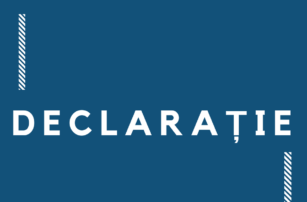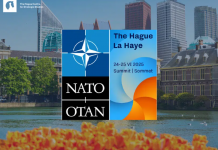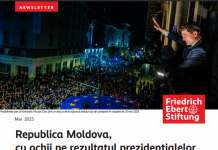The legislation of the Republic of Moldova on non-governmental organizations is obsolete, failing to provide sufficient protection against abuses. In spring 2016, the Minister of Justice, Mr. Vladimir CEBOTARI, accepted the proposal of several civil society organizations to improve the legislation on non-governmental organizationsand established a working group to this end, composed of representatives of non-governmental organizations and the Ministry of Justice.
The group worked for more than a year and prepared a draft law intended to replace the Law on Public Associations and the Law on Foundations. This draft is in line with the best international standards and practices and may represent, if adopted, a step forward in ensuring a sustainable and independent associative sector in the Republic of Moldova. The draft was endorsed by international experts and subjected to public consultations with participation of non-commercial organizations held on 14 September 2016 by the Ministry of Justice. During its activity, the working group enjoyed independence and was not subject to undue influence by the leadership of the Ministry of Justice or any other authorities. The draft Law on non-governmental organizations is ready to be promoted for adoption.
Last week, the representatives of NGOs, members of the above-referenced working group, received from the representatives of the Ministry of Justice, part of the same group, a proposal to complete the draft with three additional articles (Articles 28-30) presented by the Minister of Justice.
The additions include “special provisions on political activity of non-governmental organizations”, which significantly limit the activity of non-governmental organizations and establish prohibitions for their direct or indirect foreign financing. These restrictions refer to organizations that contribute to development and promotion of public policies intended to influence the legislative process. At the same time, these restrictions apply to the organizations that, according to the initiative, could participate or intervene in political activities, electoral campaigns, electoral programs, support political parties, their leaders or candidates, promote them or any other actions undertaken by them, either jointly or separately, both, in elections within the meaning of the Electoral Code or matters subject to a referendum, or beyond elections. These organizations will be prohibited even from accessing the 2% mechanism.
The adjustments also aim at additional financial transparency rules for all organizations that benefit from financing outside the Republic of Moldova. They should submit to the Ministry of Justice quarterly and annual financial reports, even though such reports are submitted monthly and annually with the Tax authorities of the Republic of Moldova. Moreover, the NGOs should publish other reports confirming the origin of the organization’s funds and revenues, and of the members of its management bodies as well. Additionally, organizations will have to submit a written declaration on incomes and expenditures ratio for “political activities” to the Ministry of Justice and the Central Electoral Commission and publish it on their website.
For breach of the above requirements, the Ministry of Justice will apply sanctions to the non-governmental organization and to the members of its management bodies. Some of the provided sanctions are a financial penalty in the amount of the monthly salary fund of the organization or in the amount of the material value of which the financial organization benefited in committing the breach, whichever is greater, as well as the liquidation of the organization, based on a court decision.
On 6 July 2017, the members of the working group convened in a meeting with the Minister of Justice. At this meeting, Mr. Cebotari mentioned that the proposed additions are designed to avoid the external influence on the policy of the Republic of Moldova, which is exercised, including by means of external financing of non-commercial organizations which are focusing on state policies or are supporting, directly or indirectly, initiatives of political parties. The Minister suggested to improve the text proposed by him. The representatives of the Ministry of Justice in the working group informed the representatives of NGOs from the working group that the final version of the daft to be promoted will be decided by the Ministry of Justice.
The signatory organizations consider that the proposals of the Minister of Justice cannot be supported in any way, because they are contrary to the international standards and are endangering the entire associative sector and democracy in the Republic of Moldova.
This initiative is contrary to the international standards, which do not allow such limitations for the NGOs activities. A recent analysis by the Venice Commission reveals that such limitations exist only in three member states of the Council of Europe – Russia, Hungary and Azerbaijan. Recently, the Venice Commission had a critical attitude on Hungarian law. The limitations proposed by Mr. Cebotari are even more restrictive than those in Hungary, a country that does not impose an absolute ban for foreign funding of NGOs. Moreover, the minister’s initiative is contrary to the very purpose for which the drafting of new legislation was initiated. The working group was created to improve and not to worsen the working environment of non-governmental organizations. If Minister’s intention was communicated from the outset, no non-commercial organization would have accepted to get involved in drafting such a draft Law. Furthermore, this initiative was announced at the latest possible moment, despite the fact that the same Minister created the working group more than a year ago.
The proposals represent an attack on non-governmental organizations that are active in promoting public policies or any other activities to develop participatory democracy. The absolute majority of Moldovan NGOs benefit from funds provided by development partners. Such measures will deprive the majority of active NGOs in the country of financing and the foreign political organizations and foundations working in the Republic of Moldova would be forced to cease their activity. Therefore, this will affect thousands of people directly benefiting from the NGOs activity and the functioning of democracy itself in the Republic of Moldova.
The proposed provisions are contrary to the Association Agreement between the Republic of Moldova and the European Union, which encourages the involvement of all relevant stakeholders, including civil society organizations, in developing policies and reforms in the Republic of Moldova. We must recall that the state of the Republic of Moldova itself benefits from continuous financial support from the development partners. Thus, restricting external financing for the non-governmental sector is at least disproportionate.
Furthermore, for 20 years the legislation of the Republic of Moldova has not provided for such prohibitions. Due to the fact that legislation had not provided for such bans, the associative sector in Moldova developed considerably over the past two decades. This confirms that the danger invoked by the Minister of Justice as an argument for promoting the initiative does not exist. The draft law elaborated by the working group already sets limits to the NGOs’ involvement in elections in line with best international practices. The proposed additions go much further, excessively limiting the activity of NGOs both during and after elections.
This initiative comes at a time when we are witnessing a regress in the environment of non-governmental organizations activity, including due to attacks against several civil society activists. Also, the statement made by the President Igor DODON on 26 May 2017 on the usefulness of promoting provisions limiting foreign funding of NGOs, similarly to Hungary, cannot be ignored. We would like to believe that this incident does not represent the policy promoted by the government regarding NGOs.
In the light of the foregoing, the signatory organizations call on:
- a)the Minister of Justice, to give up the initiative to limit financing of the activity of NGOs from outside, as well as any other initiatives aimed at limiting their activity, and to send the draft Law drafted by the working group to the Government for approval as soon as possible;
- b)the Government and Parliament to vote the draft law on non-governmental organizations drafted by the working group without introducing provisions that will limit the activity of NGOs. Any delay in promotion of this draft will be treated by us as an implicit confirmation of a policy of limiting the activity of the associative sector;
- c)diplomatic community and development partners of the Republic of Moldova to closely monitor the situation of civil society in the Republic of Moldova and the initiatives to suppress the activity of the associative sector in the Republic of Moldova, and to take all measures to ensure that the civil society organizations working environment and freedom of the press do not worsen.
Note: the draft law, with the additions proposed by the Minister of Justice (Art. 26-28) was published in the afternoon of 11 July 2017 after the above declaration was issued, and is available at: http://justice.gov.md/public/files/transparenta_in_procesul_decizional/coordonare/2017/iulie/11/2017_07_11_proiect_lege_ONG_final.pdf.
The English version of Declaration can be downloaded here.
The Romanian version of Declaration is available here.
The signatory organizations:
- Alliance INFONET
- Students Alliance of Moldova
- Human Rights Embassy
- Amnesty International Moldova
- Association of Independent Press (API)
- „Piligrim-Demo” Public Association
- ADR „Habitat” Public Association
- „Pro-Trebujeni” Public Association
- „QNA Moldova” Public Association
- Helsinki Citizens Assembly of Moldova
- Association for Participatory Democracy (ADEPT)
- Association for Efficient and Responsible Governance (AGER)
- Foreign Policy Association (APE)
- Promo-Lex Association
- „EuroPass” Center
- Center Partnership for Development (CPD)
- Independent Analytical Center Expert-Grup
- Legal Assistance Center for Persons with Disabilities
- Women`s Law Center
- The Human Rights Information Centre (CIDO)
- The Child Rights Information Center (CIDDC)
- „GENDERDOC-M” Information Centre
- Journalistic Investigation Centre (CIJ)
- Rehabilitation Centre for Torture Victims “Memoria”
- Legal Resources Centre from Moldova (CRJM)
- International Centre “La Strada”
- National Law Centre „AD LEGEM”
- National Center for Child Abuse Prevention (CNPAC)
- Center For Health Policies and Studies (Centrul PAS)
- Balti University Legal Clinic
- WatchDog.MD Community
- National Youth Council of Moldova (CNTM)
- CPR-Moldova
- Eco-TIRAS
- Est Europe Foundation
- Freedom Moldova Foundation
- Soros Foundation-Moldova
- Institute for Public Policy (IPP)
- Institute for European Policies and Reforms (IPRE)
- Institute for development and social initiatives “Viitorul”
- Ecological Movement of Moldova
- Transparency International Moldova (TI-Moldova)
The list of signatory organisations remains open







